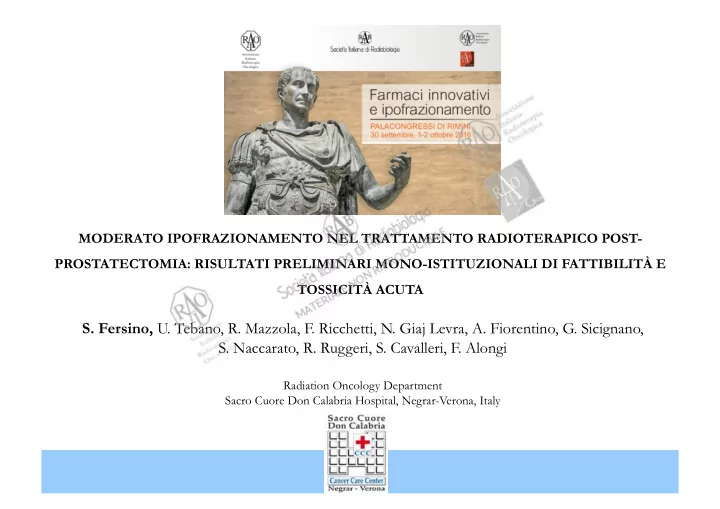

MODERATO IPOFRAZIONAMENTO NEL TRATTAMENTO RADIOTERAPICO POST- PROSTATECTOMIA: RISULTATI PRELIMINARI MONO-ISTITUZIONALI DI FATTIBILITÀ E TOSSICITÀ ACUTA S. Fersino, U. Tebano, R. Mazzola, F. Ricchetti, N. Giaj Levra, A. Fiorentino, G. Sicignano, S. Naccarato, R. Ruggeri, S. Cavalleri, F. Alongi Radiation Oncology Department Sacro Cuore Don Calabria Hospital, Negrar-Verona, Italy
Backg kgrou ound POST ST P PROST STATECT CTOMY SE Y SETTING: ADJ DJUVANT R RT O OR SA R SALVAGE?? AUA/ASTRO 2014
Backg kgrou ound low α / β for prostate cancer ample evidence exists in support of dose escalation to ≥ 78 Gy and hypofractionation for radical RT the strongest direct evidence in support of more aggressive local treatment is the findings from both randomized adjuvant trials that local failure rates were significantly greater than the metastatic failure rates (local failure was four times greater than the metastatic failure in the EORTC trial and 30% greater in the SWOG trial) An analysis of the patterns of failure from SWOG trial demonstrated that treatment failure is predominantly local, and, therefore, an improvement in local therapy will result in improved outcomes King et. al Int. JROBP 2008
Stu Study De Desig ign To evaluate feasibility and tolerability of moderate hypo fractionated regimen with image guided radiotherapy with volumetric modulated arcs (IGRT-VMAT) Material and methods December ‘12- February ‘16: 125 patients (64 pts Adjuvant RT- 61 Salvage RT) Eligible patients: ECOG 0-2 pT2-4 pN0-1 at least one of the following risk factors : capsular perforation, seminal vesicle invasion , positive surgical margins and/or PSA > 0,2 ng/ml RT doses : 65.5-71.4 Gy to prostatic bed 52.5 Gy (range 50.4-54) to the pelvic lymph nodes in 28-30 fractions
Re Results ts: A Acu cute te G Genitou itourin inary T Toxicity xicity (CTCAE v4.0) Median Follow-up: 15 months (range 6-53) ADJUVANT ¡ ¡ SALVAGE ¡ ¡
Re Results ts: A Acu cute te G Genitou itourin inary T Toxicity xicity (CTCAE v4.0) Median Follow-up: 15 months (range 6-53) ADJUVANT ¡ ¡ * SALVAGE ¡ ¡ * * 52% patients with UI before RT
Re Results ts: A Acu cute te G Gastr troin ointe testin tinal T Toxicity xicity (CTCAE v4.0) Median Follow-up: 15 months (range 6-53) ADJUVANT ¡ ¡ SALVAGE ¡ ¡
Re Results ts: A Acu cute te G Gastr troin ointe testin tinal T Toxicity xicity (CTCAE v4.0) Median Follow-up: 15 months (range 6-53) ADJUVANT ¡ ¡ SALVAGE ¡ ¡
Re Results ts Median Follow-up: 15 months (range 6-53) Analyzing data according to RT intent, a higher rate of GU toxicity ≥ 2 was found in the adjuvant setting (13.7%) respect to salvage group (7%). no difference was found between the type of surgery (Robotic,Laparoscopic or Open) and incidence of urinary incontinence. at time of analysis no late GU or GI toxicity ≥ 3 were registered.
Con Concl clusion ions moderate hypo fractionated postoperative RT with VMAT was feasible and safe with acceptable acute GU and GI toxicities Longer follow-up is needed to assess late toxicity and clinical outcome THA HANKS F S FOR A R ATTENTION!
Recommend
More recommend